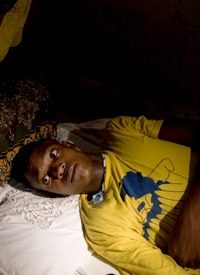
One of the most alarming incidents in recent times — several Uruguayan troops serving under the UN in Haiti held down and gang raped a teenage boy — was documented on video and spread over the Internet. The crime sparked even more anti-UN protests in the poverty-stricken Caribbean nation.
Past demonstrations, related to UN troops spreading cholera, abusing citizens, or other matters, have resulted in Haitians being killed by international forces. But this time the concerns are being taken seriously.
The resulting global uproar over what Haitian President Michel Martelly described as the “collective rape carried out against a young Haitian” caused an international scandal that is still growing. The President of Uruguay, Jose Mujica, sent a letter to Martelly earlier this week apologizing and promising accountability. “We apologize for the abuse that some soldiers of my country perpetrated,” Mujica wrote in the letter. “Although the damage is irreparable, have the certainty that we will investigate thoroughly and apply the harshest sanctions against those responsible.”
The UN, on the other hand, appeared to be more worried that the exposure might tarnish its image. “We know that while there is justifiable outrage, there are also some who would use this for political ends,” UN deputy envoy to Haiti Nigel Fisher told the Associated Press.
But while this well-documented case of gang rape has indeed triggered action, human-rights advocates say that the problem is systemic. And, they argue, it has been ignored for years.
“In 2007, it was discovered and reported that girls as young as 13 were having sex with U.N. peacekeepers for as little as $1 in Haiti,” noted Ezili Dantò, president of the Haitian Lawyers Leadership Network (HLLN), in a letter to the international body. “Moreover, Sri Lankan soldiers were accused of systematically raping Haitian women and girls, some as young as 7 years old.”
The UN claims “dozens” of its soldiers had been punished for sexual abuses in the country in recent years. But based on publicly available figures, critics say many more have escaped justice.
“If only a dozen UN peacekeepers were punished for sexual abuse and rape, then that means, for instance, most of the 114 Sri Lankan soldiers deported back to Sri Lanka from Haiti in 2007 for sexual abuse and rape in Haiti did not get punished,” Dantò wrote, citing other examples as well. “Humanitarian aid workers and UN peacekeepers accused of sexually abusing and sexual trafficking children in Haiti should have their names and their country’s identities exposed so that this matter may be cleaned up once and for all.”
On the other side of the Atlantic ocean, similar abuses by UN troops in the Ivory Coast also made headlines this week. A 2010 U.S. diplomatic cable recently released by WikiLeaks showed that the international body’s soldiers were coercing underage girls to have sex in exchange for food and other essentials.
A poll conducted by the non-profit group Save the Children revealed that eight out of 10 minor girls in the Ivorian town of Toulepleu admitted to regularly engaging in sexual acts with UN troops. In an interview with the AP about the leak, a UN spokesman admitted commanders had “failed to maintain an environment that prevents sexual exploitation and abuse.”
But despite the new-found attention, the problem is hardly new. Even the UN acknowledges that there have been hundreds of “substantiated” cases of sexual exploitation by armed forces under its command just in recent years.
As The New American reported, UN-backed troops in Somalia and the Congo came under fire over similar accusations last year. Numerous human-rights organizations noted that the soldiers were raping women and children, burning down villages, killing civilians, and more.
Earlier this year in the Ivory Coast, UN-backed troops trying to replace the nation’s Catholic leader with a Muslim central banker slaughtered well over 1,000 Christians — probably more. The soldiers reportedly engaged in widespread rape and murder as they marched toward the capital.
And before that, scandals such as a UN pedophile ring in the Congo drew widespread condemnation. UN peace-keeping forces’ involvement with child sex-slave trafficking in Kosovo years ago is still making headlines this week.
In 2004, following an investigation into pedophilia, rape, and human trafficking by UN forces in Africa, even former UN boss Kofi Annan was forced to concede that there were serious problems. “I am afraid there is clear evidence that acts of gross misconduct have taken place,” he said. “This is a shameful thing for the United Nations to have to say.”
But it continued. A 2006 investigation by the BBC found that “children have been subjected to rape and prostitution by United Nations peacekeepers in Haiti and Liberia.” And senior officials with the international body admitted that the UN knew the tragedies had been occurring all along.
“We’ve had a problem probably since the inception of peacekeeping — problems of this kind of exploitation of vulnerable populations,” then-Assistant Secretary General for peacekeeping operations Jane Holl Lute told the BBC. “My operating presumption is that this is either a problem or a potential problem in every single one of our missions.”
While the UN continues to claim that it is working to stop the apparently systematic sexual abuse of women and children carried out by its forces stationed around the world, critics aren’t buying it. Activists are still hoping, however, that with the new revelations and the growing outrage, something will have to change.
Photo of teenage boy raped by Uruguayan troops: AP Images



